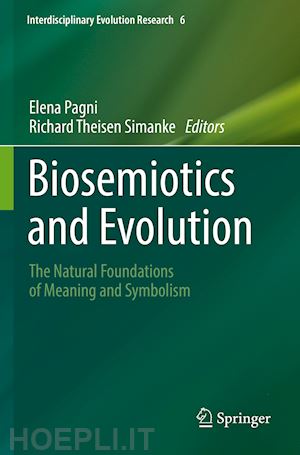
Questo prodotto usufruisce delle SPEDIZIONI GRATIS
selezionando l'opzione Corriere Veloce in fase di ordine.
Pagabile anche con Carta della cultura giovani e del merito, 18App Bonus Cultura e Carta del Docente
This book reviews the evolution of Biosemiotics and gives an outlook on the future of this interdisciplinary new discipline. In this volume, the foundations of symbolism are transformed into a phenomenological, technological, philosophical and psychological discussion enriching the readers’ knowledge of these foundations. It offers the opportunity to rethink the impact that evolution theory and the confirmations about evolution as a historical and natural fact, has had and continues to have today.
The book is divided into three parts:
It starts by laying out a general historical, philosophical, and scientific framework for the collection of studies that will follow. In the following some of the main reference models of evolutionary theories are revisited: Extended Synthesis, Formal Darwinismand Biosemiotics.
The authors shed new light on how to rethink the processes underlying the origins and evolution of knowledge, the boundary between teleonomic and teleological paradigms of evolution and their possible integration, the relationship between linguistics and biological sciences, especially with reference to the concept of causality, biological information and the mechanisms of its transmission, the difference between physical and biosemiotic intentionality, as well as an examination of the results offered or deriving from the application in the economics and the engineering of design, of biosemiotic models for the transmission of culture, digitalization and proto-design.
This volume is of fundamental scientific and philosophical interest, and seen as a possibility for a dialogue based on theoretical and methodological pluralism. The international nature of the publication, with contributions from all over the world, will allow a further development of academic relations, at the service of the international scientific and humanistic heritage.Elena Pagni graduated in Philosophy (University of Pisa - Italy) with a thesis on Aristotle and his view of perception, and was awarded a PhD in Philosophy from the University of Florence. She has been member of the Research Laboratory ”Epistemologica" (University of Firenze, Italy), directed by Prof. Roberta Lanfredini. She got a one-year post doc (Research in Paris fellowship) in philosophy of biology at the Ens of Paris (Centre Cavaillès), under the supervision of Dr. Giuseppe Longo, did a post doc scholarship at the PPG in Psychology at the Federal University of Juiz de Fora (scholarship of the PNPD/Capes Program) under the direction of Prof. Richard Theisen Simanke, and a post doc at the Faculdade de Filosofia, Ciências e Letras de Ribeirão Preto, Departamento de Psicologia, Brazil, under the direction of Prof. Reinaldo Furlan. From 2018 to 2021 she has been a visiting professor, with exclusive dedication, at the Department of Philosophy of the Institute of Human Sciences at the Federal University of Juiz De Fora.
Research fields: Ancient Philosophy, Phenomenology, Biosemiotics, evolutionary processes of biological in-formation, biological problem of individuality, problem of meaning in nature, biosemiotic paradigm in the life sciences
Richard Theisen Simanke graduated in Philosophy and Methodology of Science from the Federal University of São Carlos (Brazil) and was awarded a Ph.D. in Philosophy from the State University of São Paulo (Brazil). He was Professor of History and Philosophy of Psychoanalysis in the Department of Philosophy and Methodology of Science at the Federal University of São Carlos, Brazil until 2012 and is currently Professor of History and Philosophy of Psychology in the Department of Psychology at the Federal University of Juiz de Fora, Brazil. His fields of expertise are the history and philosophy of psychoanalysis, history and philosophy of psychology, history and philosophy of science, and science and phenomenology. His secondary research interests are philosophy of biology, history and philosophy of psychiatry and the history of sexuality.











Il sito utilizza cookie ed altri strumenti di tracciamento che raccolgono informazioni dal dispositivo dell’utente. Oltre ai cookie tecnici ed analitici aggregati, strettamente necessari per il funzionamento di questo sito web, previo consenso dell’utente possono essere installati cookie di profilazione e marketing e cookie dei social media. Cliccando su “Accetto tutti i cookie” saranno attivate tutte le categorie di cookie. Per accettare solo deterninate categorie di cookie, cliccare invece su “Impostazioni cookie”. Chiudendo il banner o continuando a navigare saranno installati solo cookie tecnici. Per maggiori dettagli, consultare la Cookie Policy.